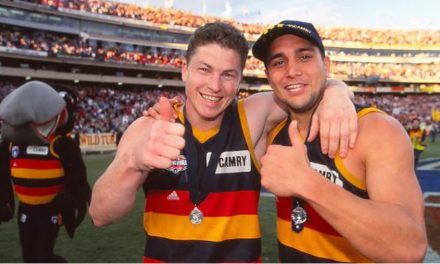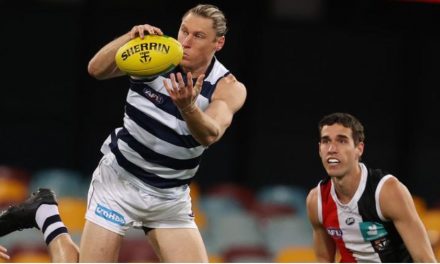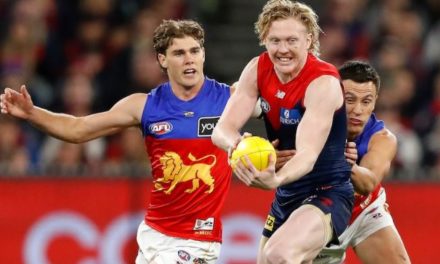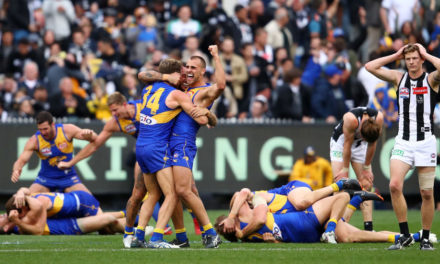Dejected Essendon players leave the MCG after last Sunday’s post-siren loss to Collingwood. Photo: GETTY IMAGES
“We turned it around. There’s a couple of things we’d like to do better in the last few minutes, but that’s learning for us.”
That’s Essendon coach Ben Rutten after that disastrous last play against Collingwood last Sunday, right?
Well, no. Actually, that’s former Essendon coach John Worsfold, back in 2017, after the Bombers had surrendered what had been a 19-point lead against Sydney with just four-and-a-half minutes remaining.
From there, Essendon committed a lengthy catalogue of sins culminating in a goal after the siren to the Swans’ Gary Rohan, to turn what should have been a memorable win into an infamous loss, one now sitting alongside last weekend’s disaster in the annals of Bomber nightmares.
Just four players who played in that game are left at the club – Dyson Heppell, Andrew McGrath, Zach Merrett and Kyle Langford. All were there again against the Magpies. And on Wednesday, McGrath, facing the media, was asked about that already-infamous last minute against Collingwood.
“We’ll definitely learn from that and be better for it next time,” McGrath said.
So, he and the other three hadn’t actually learned anything from that loss five years ago? Harsh, maybe, but you could forgive considerable numbers of long-suffering Essendon fans for being dubious about the prospect.
They’ve heard a heap of Essendon players, coaches and officials use that word “learning” a lot over recent years.
It was a favourite of Worsfold’s when he coached the Bombers. His successor, Rutten, has been known to use it on occasion. Bomber players use it a lot. Indeed, cynics would suggest Essendon seem to have absorbed so many “learnings” over time it’s a wonder the players don’t have “PhD” next to their names on the team sheet.
But it’s not the only buzzword that circulates around The Hangar these days when Essendon goes about its business. A favourite this year seems to be that “improvement is not always linear”, a more impressive way of saying that performance might go up and down during a team’s development.
A more accurate phrase might be “improvement is not always on time” given Essendon now makes a habit of poor starts to seasons (four times in the last five years) then finding its feet regularly too late in the piece.
Why, if “learnings” are so valued by the Bombers, has the same situation repeated itself on a seemingly annual basis, let alone last-minute disasters within specific games during that period?
And even if improvement isn’t “linear”, do finishing positions of this season no higher than 12th preceded (in order) by eighth, 13th, eighth, 11th and eighth actually indicate any improvement at all?
How does that linear improvement line look when contrasted with rival clubs who swing some changes and watch things change dramatically? Take the “learnings” concept and Collingwood, for example.
People might argue that the Magpies have had their share of luck in winning eight of the nine games they’ve played decided by 11 points or less this season. But consider that last year, they played in six games decided by 12 points or less and lost five of them. That dramatic a change cannot be mere coincidence. Of course, Collingwood has actually learned.
Carlton for many years had been stuck in a rut similar to Essendon’s. The Blues finally did make some sweeping changes, a new chairman, chief executive and coach in charge. And a whole club has responded, Carlton set to play in finals for the first time since 2013.
PLEASE HELP US CONTINUE TO THRIVE BY BECOMING AN OFFICIAL FOOTYOLOGY PATRON. JUST CLICK THIS LINK.
Sydney has been up, down and is very much on the up again since those 2017 comments of Worsfold’s. Hawthorn fell but is on the way back. And those Pies, for what it’s worth have been grand finalists, a bottom two team, and who knows how high again this season.
Building a sustainably successful team doesn’t have to be the sort of torturous and marathon odyssey Essendon have regularly portrayed it as. It’s about putting the right people in place. And having the right people selecting those people.
The Bombers deserve to be the subject of some scepticism on both those counts for obvious reasons; the lack of success over a long period, and the long list of fruitless football department appointments over that journey.
For Essendon fans, as disillusioned as perhaps at any time in the club’s history right now, the rationalisations, the excuses, the words per se have ceased to have much meaning. Perhaps for the media, also. And that is perhaps just as well for the club.
McGrath is an articulate young man, and for 15 minutes on Wednesday he answered the media’s questions as required. But if Essendon was still really a big-ticket item in terms of news, some of what he said, put under the microscope, wouldn’t stand up to much scrutiny.
Like: “We’re extremely disappointed in how we started the year. For whatever reason, things didn’t click for us.” Whatever reason? Shouldn’t it be pretty apparent now exactly what those reasons were?
And: “We’ve got a lot more guys on same page now than we did at the start of the year.” Well, that’s a relief. But can we ask why the hell they weren’t on the same page in March when you’d had six months to make sure that was the case since the end of the previous season?
McGrath said Essendon, since its round nine thrashing at the hands of Sydney, had “committed to each other to respond and to become better as players and coaches, and I think we’ve done that”.
Have you, though, Andy? Let’s get real. Since then, you’ve lost another three games in a row to Richmond, Port Adelaide and Carlton, beaten an erratic St Kilda and a half-strength Brisbane, handed West Coast just its second win of the season, had admittedly impressive victories of Sydney in a return bout and Gold Coast, then not turned up for a quarter against Collingwood, fought back to a seemingly impregnable position, then blown it anyway.
None of this, mind you, with the pressure of a potential finals spot ever a realistic proposition once that loss at the SCG had left the Bombers 2-7.
Becoming better players and coaches to a level anything like what is required for a team to go all the way requires so much more than those very moderate results, and for a lot longer.
There’s some free advice, Essendon. Call it a learning, too, if it helps. Personally, though, I’d say it was more of a reality check. And for the Bombers, a few more of those over the past couple of decades wouldn’t have gone astray.
This article first appeared at ESPN.












I’m glad you put “learnings” in inverted commas, Rohan. That’s what you should do to words that don’t exist (see also “behaviours”).